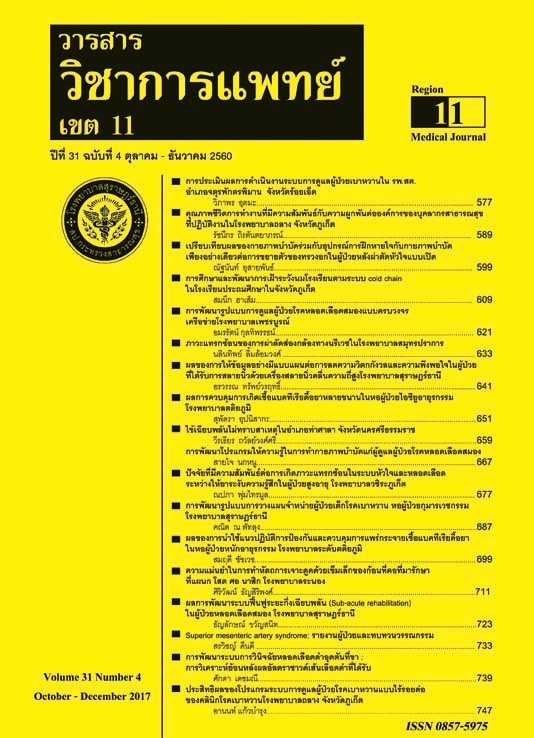Effectiveness Program of Diabetes Mellitus Care System on Seamless Network at Thalang Hospital, Phuket Province.
Keywords:
Diabetes Mellitus type 2, Effectiveness, program of Diabees Mellitus Care System on Seamless networkAbstract
This Quasi experimental research (one group pretest-posttest design) was to study the effectiveness program of diabetes mellitus care system on seamless network in Diabetes Mellitus clinic at Thalanghospital. Population in this study consisted of 50 diabetes mellitus type 2. This program was developed from all significantly factors from research study in phrase 1 including, 1.Health behavior 2.Health accessability 3.Health perception. 4.The program was developed 5 activities including, knowledge increasing and health perception, self-management, self-reinforcement, knowledge sharing, self-following-up and assessment in lasted 4 months. The instrument used for data collection was questionnaire and behavior-record form and data analyzed to test research hypothesis by Paired Sample t-test.
The result showed that , the factors significantly increased mean score of health behavior (P-Value<0.001), were health service system accessibility (P-Value<0.001), health perception (P-Value<0.001), and control blood sugar level (P-Value<0.003). The result revealed the perceived barrier of treatment before and after the test was not statistical significance(P-Value=0.347). These finding, show the study time for 4 months may be not enough. Thus, the new research study will be create by the qualitative research and participatory research to emphasize diabetes mellitus treatment and encourage of self-care health behavior changing of diabetic patient.
References
2. โรงพยาบาลถลาง. โรงพยาบาลถลาง: แบบสำรวจบุคลากร 2558. เอกสารเผยแพร่ปี พ.ศ.2558;2559
3. ละออ ชัยลิตร. การรับรู้ต่อการเกิดโรคและพฤติกรรมการดูแลตนเองเพื่อป้องกันโรคเบาหวานของพระนิสิต มหาวิทยาลัยมหาจุฬาลงกรณ์ราชวิทยาลัยวิทยาเขตขอนแก่น.วิทยานิพนธ์ปริญญาสาธารณสุขศาสตรมหาบัณฑิต, มหาวิทยาลัยขอนแก่น; 2557.
4. สมพงษ์ สุวรรณวลัยกร.การให้ความรู้โรคเบาหวาน.กรุงเทพมหานคร โรงพิมพ์แห่งจุฬาลงกรณ์มหาวิทยาลัย; 2545.
5. สำนักงานสาธารณสุขจังหวัดภูเก็ต. เอกสารประกอบการตรวจราชการและนิเทศงานกรณีปกติรอบที่ 1 ปีงบประมาณ 2558 (28-30 มกราคม 2558).[ออนไลน์].2559[สืบค้นเมื่อวันที่ 10 สิงหาคม 2559]. แหล่งข้อมูล Website: http://www.pkto.moph.go.th/
6. อานนท์ แก้วบำรุง. ประสิทธิผลของโปรแกรมระบบการดูแลผู้ป่วยโรคเบาหวานแบบไร้รอยต่อของคลินิกโรคเบาหวานโรงพยาบาลถลาง จังหวัดภูเก็ต: การศึกษาระยะที่ 1 ปัจจัยที่มีผลต่อการควบคุมระดับน้ำตาลของผู้ป่วยโรคเบาหวานชนิดที่ 2 อำเภอถลาง จังหวัดภูเก็ต. โรงพยาบาลถลาง; 2560.
7. อัจฉรา จินดาวัฒนวงศ์, นพวรรณ เปียซื่อ, พัชรินทร์ นินทจันทร์. ความสัมพันธ์ระหว่างการรับรู้ความเชื่อด้านสุขภาพกับพฤติกรรมการป้องกันโรคเบาหวานชนิดที่ 2 ในนักเรียนมัธยมศึกษาตอนปลาย. วารสารพยาบาลรามาธิบดี; 2555; 8(1): 58-69.
8. Bandura A. Social learning Theory.Englewood cliffs, NJ: Prentice-Hall; 1977.
9. Best, John W. Research is Evaluation. (3rded). Englewod cliffs: N.J. Prentice Hall; 1977.
10. Orem, D. E. Nursing: Concepts of practice (4thed.). St. Louis: Mosby Year Book; 2001.
11. Rosenstock. History origins of the health belief model: Health Education Monograph; 1974.
12. Saiwong S. The effectiveness if health promotion program on behavioral modification for dietary control and exercise among type 2 diabetes patients at Pathumthani hospital, Pathumthani province.Unpublished master’ thesis, Mahidol University, Bangkok, Thailand; 2004.
13. World Health Organization (WHO). Diabetes : Cost. [online]. 2009 [cited November 12, 2016], Available from: URL:http://WWW.who.int/dietphysicalactivity/publications/facts/diabetes/en/






